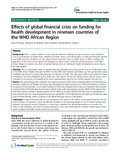| dc.contributor.author | Kirigia, Joses M | |
| dc.contributor.author | Nganda, Benjamin M | |
| dc.contributor.author | Mwikisa, Chris N | |
| dc.contributor.author | Mwikisa, Chris N | |
| dc.contributor.author | Cardoso, Bernardino | |
| dc.date.accessioned | 2018-10-22T09:00:28Z | |
| dc.date.accessioned | 2020-02-07T10:17:01Z | |
| dc.date.available | 2018-10-22T09:00:28Z | |
| dc.date.available | 2020-02-07T10:17:01Z | |
| dc.date.issued | 2011 | |
| dc.identifier.uri | http://repository.must.ac.ke/handle/123456789/1362 | |
| dc.description.abstract | There is ample evidence in Asia and Latin America showing that past economic crises resulted in cuts in expenditures on health, lower utilization of health services, and deterioration of child and maternal nutrition and health outcomes. Evidence on the impact of past economic crises on health sector in Africa is lacking. The objectives of this article are to present the findings of a quick survey conducted among countries of the WHO African Region to monitor the effects of global financial crisis on funding for health development; and to discuss the way forward.This is a descriptive study. A questionnaire was prepared and sent by email to all the 46 Member States in the WHO African Region through the WHO Country Office for facilitation and follow up. The questionnaires were completed by directors of policy and planning in ministries of health. The data were entered and analyzed in Excel spreadsheet. The main limitations of this study were that authors did not ask whether other relevant sectors were consulted in the process of completing the survey questionnaire; and that the overall response rate was low.The main findings were as follows: the response rate was 41.3% (19/46 countries); 36.8% (7/19) indicated they had been notified by the Ministry of Finance that the budget for health would be cut; 15.8% (3/19) had been notified by partners of their intention to cut health funding; 61.1% (11/18) indicated that the prices of medicines had increased recently; 83.3% (15/18) indicated that the prices of basic food stuffs had increased recently; 38.8% (7/18) indicated that their local currency had been devalued against the US dollar; 47.1% (8/17) affirmed that the levels of unemployment had increased since the onset of global financial crisis; and 64.7% (11/17) indicated that the ministry of health had taken some measures already, either in reaction to the global financing crisis, or in anticipation. | en_US |
| dc.language.iso | en | en_US |
| dc.publisher | BioMed Central | en_US |
| dc.subject | Gross Domestic Product,Global Financial Crisis, African Region, Health Development, Official Development Assistance | en_US |
| dc.title | Effects of global financial crisis on funding for health development in nineteen countries of the WHO African Region | en_US |
| dc.type | Article | en_US |

